Sociology Assignment: Analyzing Social Class Influence on Families
VerifiedAdded on 2022/10/05
|6
|1059
|377
Essay
AI Summary
This essay examines the multifaceted impact of social class on family experiences. It begins with an introductory section defining social class and its influence, followed by a theoretical section that applies structural functionalism, social conflict, and exchange theory to analyze the topic. The essay then delves into a critical thinking analysis, exploring how social class position, particularly for upper-class families, affects various aspects of family life, including access to resources, educational opportunities, and potential familial conflicts. The author references several sociological studies and provides a comprehensive overview of how social class shapes family dynamics and outcomes. The paper explores the interplay between social class, family life, and societal structures, presenting a well-rounded understanding of the subject.
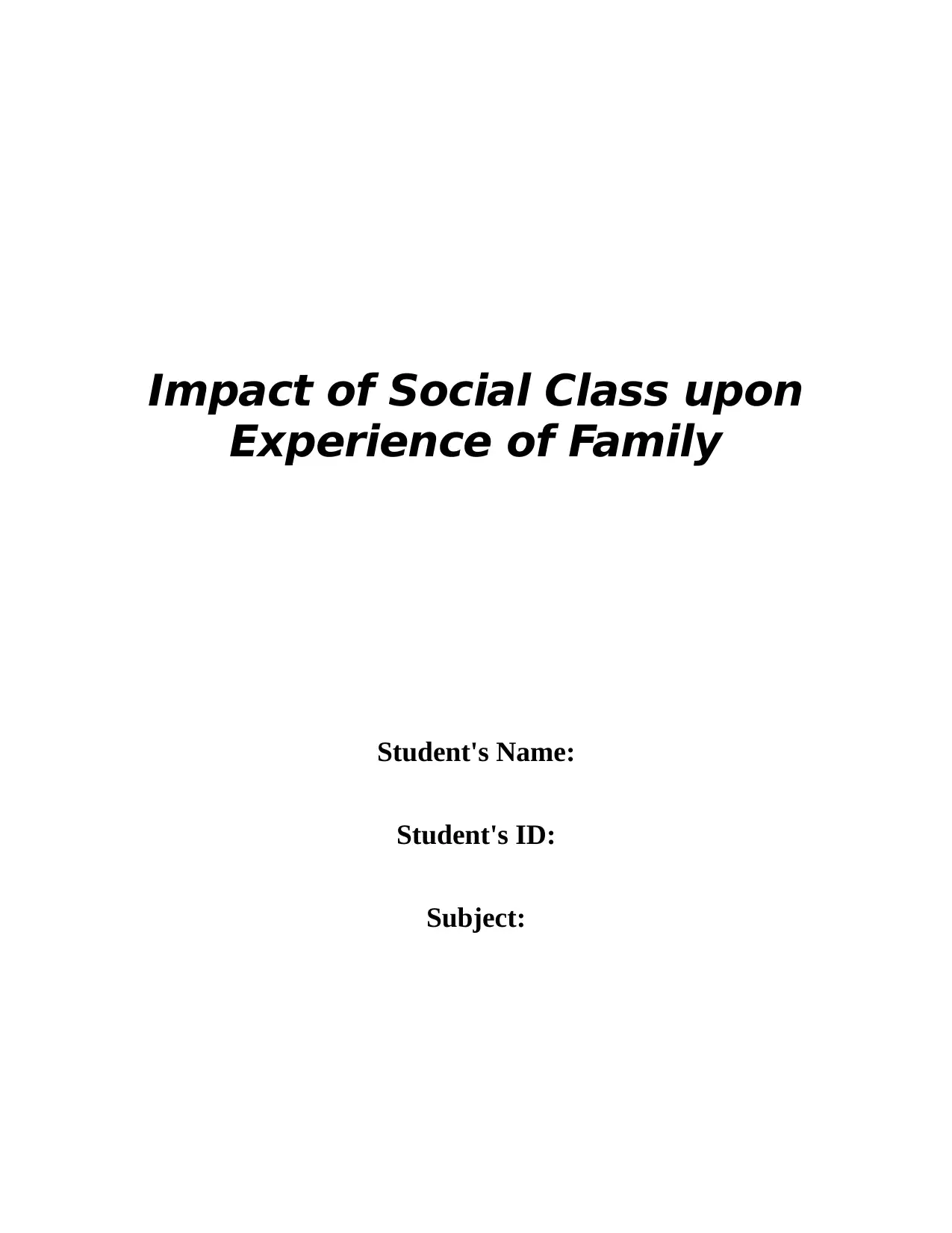
Impact of Social Class upon
Experience of Family
Student's Name:
Student's ID:
Subject:
Experience of Family
Student's Name:
Student's ID:
Subject:
Paraphrase This Document
Need a fresh take? Get an instant paraphrase of this document with our AI Paraphraser
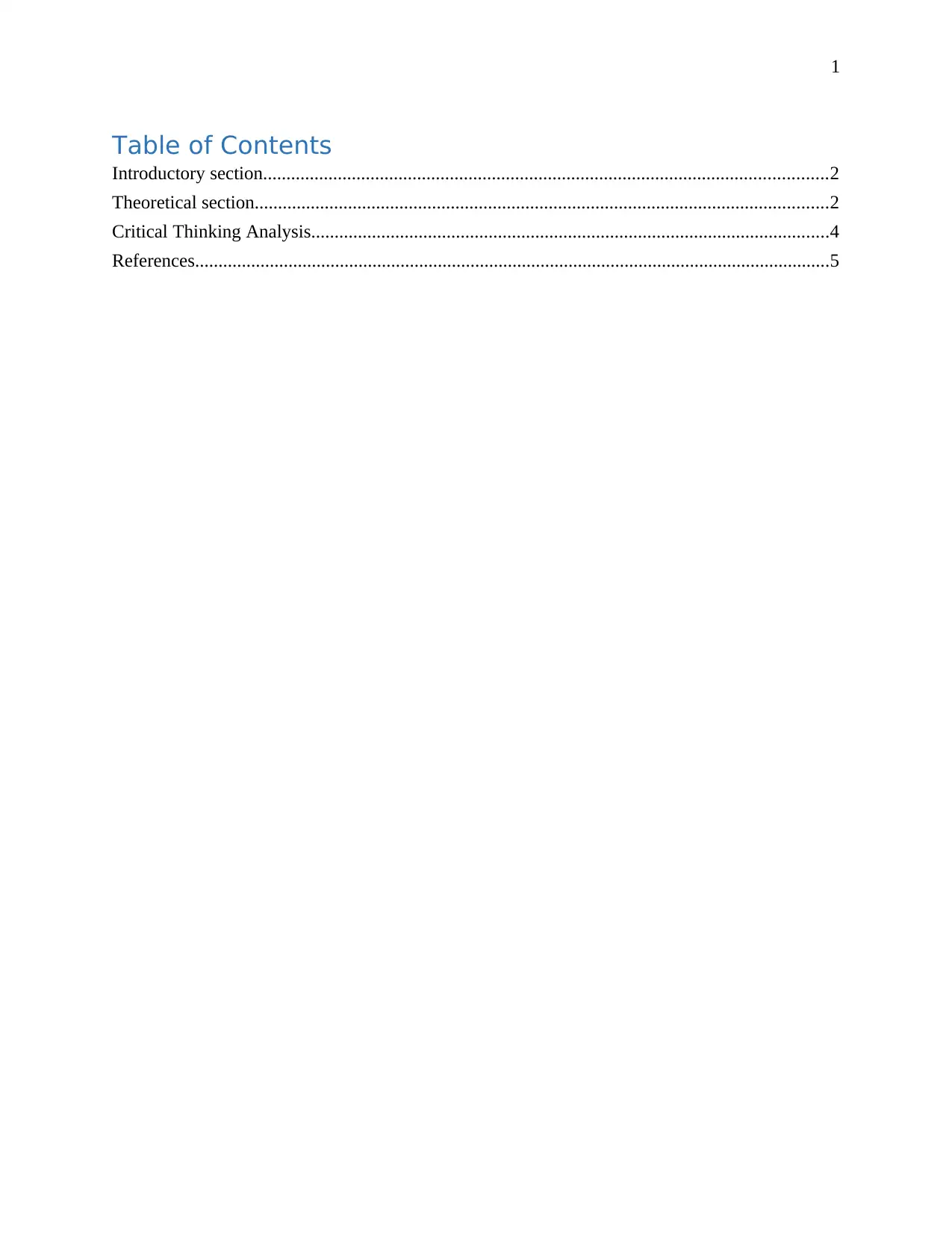
1
Table of Contents
Introductory section.........................................................................................................................2
Theoretical section...........................................................................................................................2
Critical Thinking Analysis...............................................................................................................4
References........................................................................................................................................5
Table of Contents
Introductory section.........................................................................................................................2
Theoretical section...........................................................................................................................2
Critical Thinking Analysis...............................................................................................................4
References........................................................................................................................................5
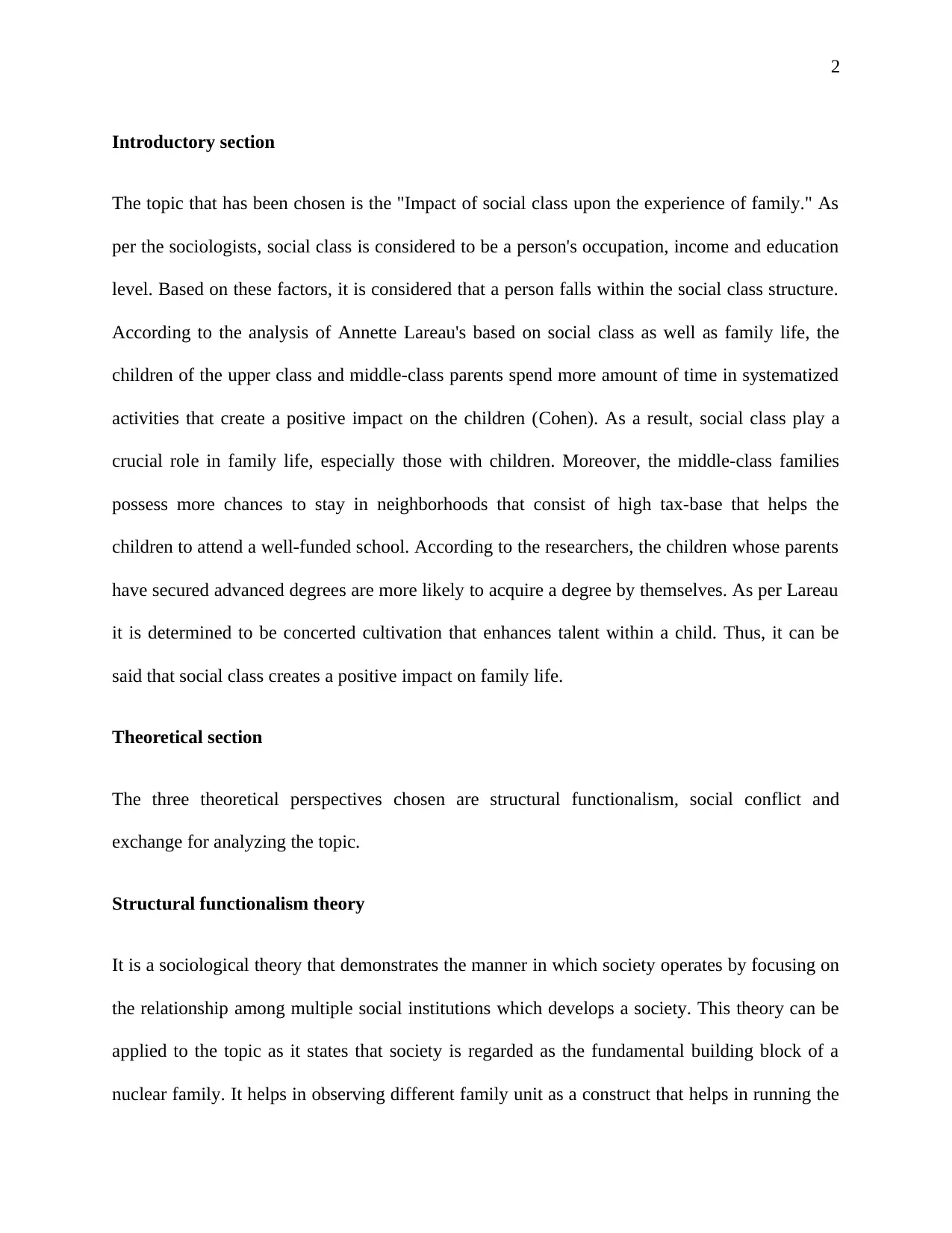
2
Introductory section
The topic that has been chosen is the "Impact of social class upon the experience of family." As
per the sociologists, social class is considered to be a person's occupation, income and education
level. Based on these factors, it is considered that a person falls within the social class structure.
According to the analysis of Annette Lareau's based on social class as well as family life, the
children of the upper class and middle-class parents spend more amount of time in systematized
activities that create a positive impact on the children (Cohen). As a result, social class play a
crucial role in family life, especially those with children. Moreover, the middle-class families
possess more chances to stay in neighborhoods that consist of high tax-base that helps the
children to attend a well-funded school. According to the researchers, the children whose parents
have secured advanced degrees are more likely to acquire a degree by themselves. As per Lareau
it is determined to be concerted cultivation that enhances talent within a child. Thus, it can be
said that social class creates a positive impact on family life.
Theoretical section
The three theoretical perspectives chosen are structural functionalism, social conflict and
exchange for analyzing the topic.
Structural functionalism theory
It is a sociological theory that demonstrates the manner in which society operates by focusing on
the relationship among multiple social institutions which develops a society. This theory can be
applied to the topic as it states that society is regarded as the fundamental building block of a
nuclear family. It helps in observing different family unit as a construct that helps in running the
Introductory section
The topic that has been chosen is the "Impact of social class upon the experience of family." As
per the sociologists, social class is considered to be a person's occupation, income and education
level. Based on these factors, it is considered that a person falls within the social class structure.
According to the analysis of Annette Lareau's based on social class as well as family life, the
children of the upper class and middle-class parents spend more amount of time in systematized
activities that create a positive impact on the children (Cohen). As a result, social class play a
crucial role in family life, especially those with children. Moreover, the middle-class families
possess more chances to stay in neighborhoods that consist of high tax-base that helps the
children to attend a well-funded school. According to the researchers, the children whose parents
have secured advanced degrees are more likely to acquire a degree by themselves. As per Lareau
it is determined to be concerted cultivation that enhances talent within a child. Thus, it can be
said that social class creates a positive impact on family life.
Theoretical section
The three theoretical perspectives chosen are structural functionalism, social conflict and
exchange for analyzing the topic.
Structural functionalism theory
It is a sociological theory that demonstrates the manner in which society operates by focusing on
the relationship among multiple social institutions which develops a society. This theory can be
applied to the topic as it states that society is regarded as the fundamental building block of a
nuclear family. It helps in observing different family unit as a construct that helps in running the
⊘ This is a preview!⊘
Do you want full access?
Subscribe today to unlock all pages.

Trusted by 1+ million students worldwide
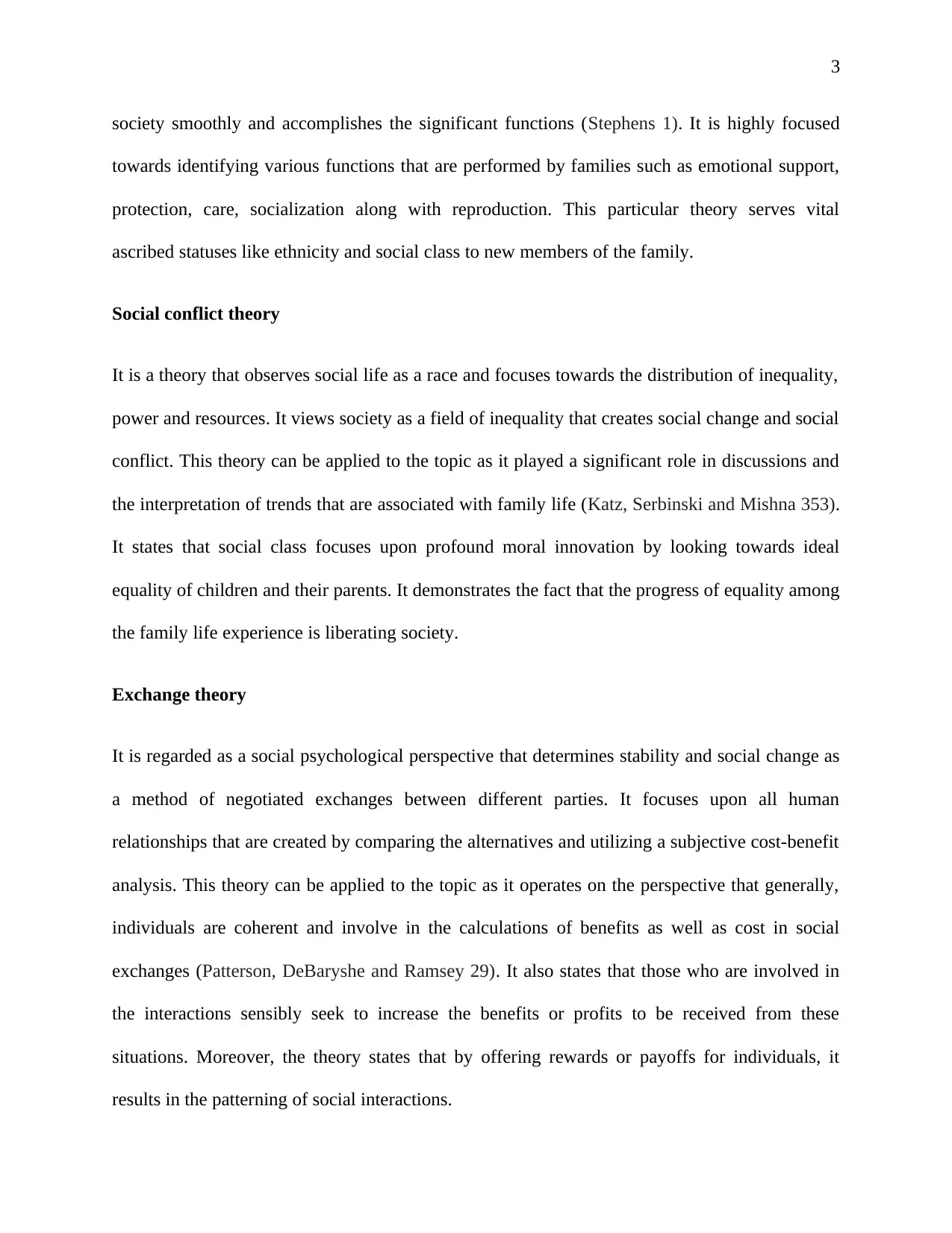
3
society smoothly and accomplishes the significant functions (Stephens 1). It is highly focused
towards identifying various functions that are performed by families such as emotional support,
protection, care, socialization along with reproduction. This particular theory serves vital
ascribed statuses like ethnicity and social class to new members of the family.
Social conflict theory
It is a theory that observes social life as a race and focuses towards the distribution of inequality,
power and resources. It views society as a field of inequality that creates social change and social
conflict. This theory can be applied to the topic as it played a significant role in discussions and
the interpretation of trends that are associated with family life (Katz, Serbinski and Mishna 353).
It states that social class focuses upon profound moral innovation by looking towards ideal
equality of children and their parents. It demonstrates the fact that the progress of equality among
the family life experience is liberating society.
Exchange theory
It is regarded as a social psychological perspective that determines stability and social change as
a method of negotiated exchanges between different parties. It focuses upon all human
relationships that are created by comparing the alternatives and utilizing a subjective cost-benefit
analysis. This theory can be applied to the topic as it operates on the perspective that generally,
individuals are coherent and involve in the calculations of benefits as well as cost in social
exchanges (Patterson, DeBaryshe and Ramsey 29). It also states that those who are involved in
the interactions sensibly seek to increase the benefits or profits to be received from these
situations. Moreover, the theory states that by offering rewards or payoffs for individuals, it
results in the patterning of social interactions.
society smoothly and accomplishes the significant functions (Stephens 1). It is highly focused
towards identifying various functions that are performed by families such as emotional support,
protection, care, socialization along with reproduction. This particular theory serves vital
ascribed statuses like ethnicity and social class to new members of the family.
Social conflict theory
It is a theory that observes social life as a race and focuses towards the distribution of inequality,
power and resources. It views society as a field of inequality that creates social change and social
conflict. This theory can be applied to the topic as it played a significant role in discussions and
the interpretation of trends that are associated with family life (Katz, Serbinski and Mishna 353).
It states that social class focuses upon profound moral innovation by looking towards ideal
equality of children and their parents. It demonstrates the fact that the progress of equality among
the family life experience is liberating society.
Exchange theory
It is regarded as a social psychological perspective that determines stability and social change as
a method of negotiated exchanges between different parties. It focuses upon all human
relationships that are created by comparing the alternatives and utilizing a subjective cost-benefit
analysis. This theory can be applied to the topic as it operates on the perspective that generally,
individuals are coherent and involve in the calculations of benefits as well as cost in social
exchanges (Patterson, DeBaryshe and Ramsey 29). It also states that those who are involved in
the interactions sensibly seek to increase the benefits or profits to be received from these
situations. Moreover, the theory states that by offering rewards or payoffs for individuals, it
results in the patterning of social interactions.
Paraphrase This Document
Need a fresh take? Get an instant paraphrase of this document with our AI Paraphraser
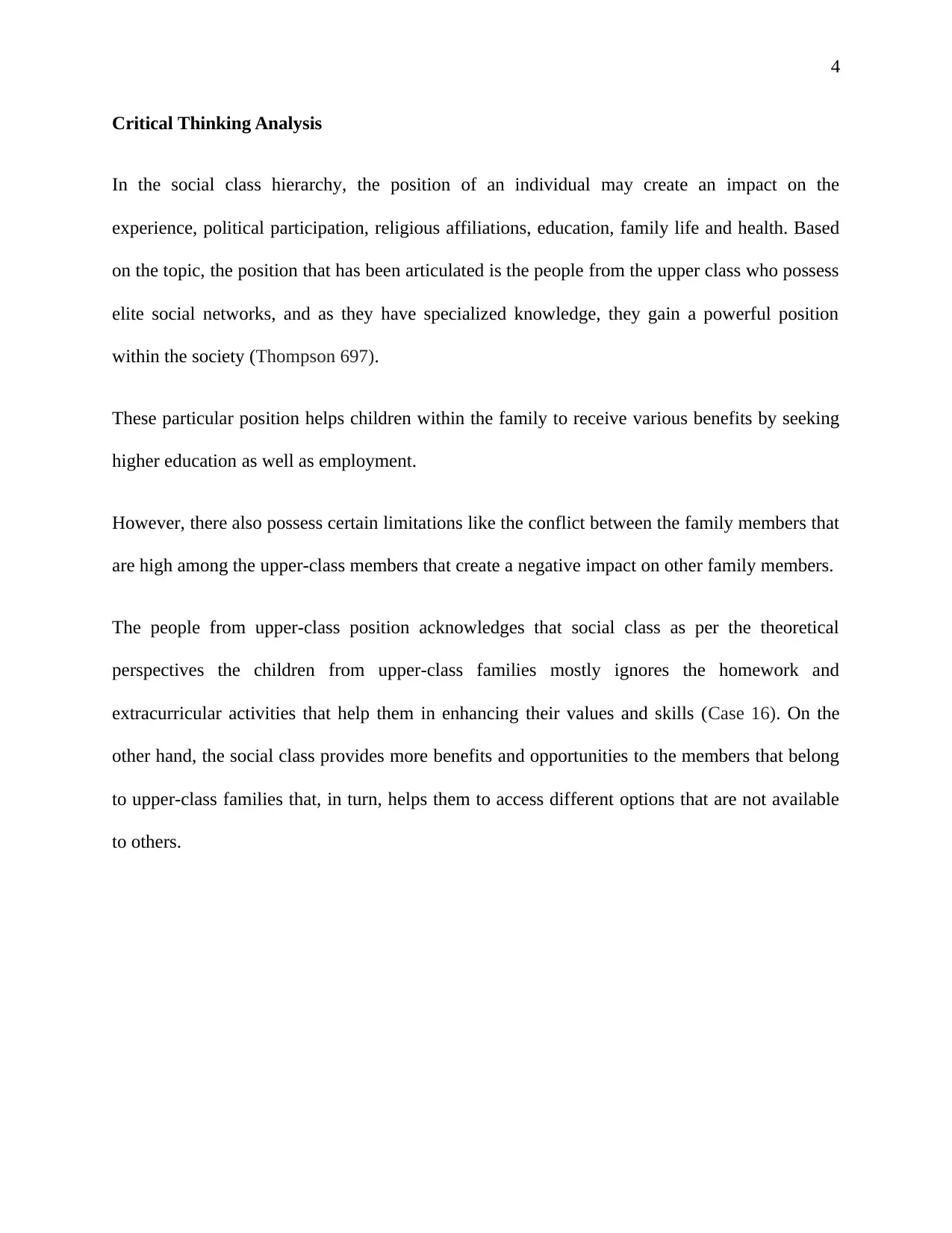
4
Critical Thinking Analysis
In the social class hierarchy, the position of an individual may create an impact on the
experience, political participation, religious affiliations, education, family life and health. Based
on the topic, the position that has been articulated is the people from the upper class who possess
elite social networks, and as they have specialized knowledge, they gain a powerful position
within the society (Thompson 697).
These particular position helps children within the family to receive various benefits by seeking
higher education as well as employment.
However, there also possess certain limitations like the conflict between the family members that
are high among the upper-class members that create a negative impact on other family members.
The people from upper-class position acknowledges that social class as per the theoretical
perspectives the children from upper-class families mostly ignores the homework and
extracurricular activities that help them in enhancing their values and skills (Case 16). On the
other hand, the social class provides more benefits and opportunities to the members that belong
to upper-class families that, in turn, helps them to access different options that are not available
to others.
Critical Thinking Analysis
In the social class hierarchy, the position of an individual may create an impact on the
experience, political participation, religious affiliations, education, family life and health. Based
on the topic, the position that has been articulated is the people from the upper class who possess
elite social networks, and as they have specialized knowledge, they gain a powerful position
within the society (Thompson 697).
These particular position helps children within the family to receive various benefits by seeking
higher education as well as employment.
However, there also possess certain limitations like the conflict between the family members that
are high among the upper-class members that create a negative impact on other family members.
The people from upper-class position acknowledges that social class as per the theoretical
perspectives the children from upper-class families mostly ignores the homework and
extracurricular activities that help them in enhancing their values and skills (Case 16). On the
other hand, the social class provides more benefits and opportunities to the members that belong
to upper-class families that, in turn, helps them to access different options that are not available
to others.
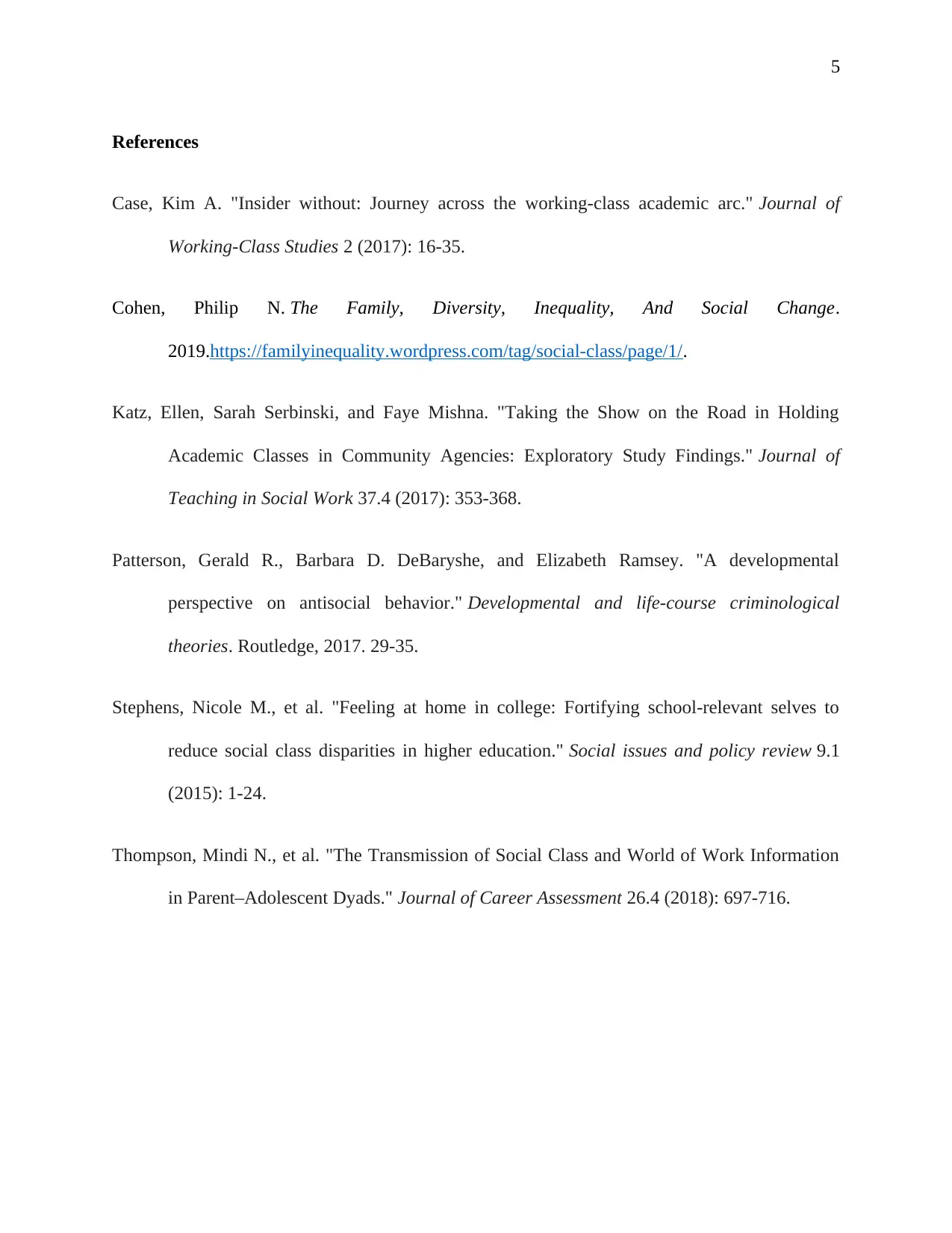
5
References
Case, Kim A. "Insider without: Journey across the working-class academic arc." Journal of
Working-Class Studies 2 (2017): 16-35.
Cohen, Philip N. The Family, Diversity, Inequality, And Social Change.
2019.https://familyinequality.wordpress.com/tag/social-class/page/1/.
Katz, Ellen, Sarah Serbinski, and Faye Mishna. "Taking the Show on the Road in Holding
Academic Classes in Community Agencies: Exploratory Study Findings." Journal of
Teaching in Social Work 37.4 (2017): 353-368.
Patterson, Gerald R., Barbara D. DeBaryshe, and Elizabeth Ramsey. "A developmental
perspective on antisocial behavior." Developmental and life-course criminological
theories. Routledge, 2017. 29-35.
Stephens, Nicole M., et al. "Feeling at home in college: Fortifying school‐relevant selves to
reduce social class disparities in higher education." Social issues and policy review 9.1
(2015): 1-24.
Thompson, Mindi N., et al. "The Transmission of Social Class and World of Work Information
in Parent–Adolescent Dyads." Journal of Career Assessment 26.4 (2018): 697-716.
References
Case, Kim A. "Insider without: Journey across the working-class academic arc." Journal of
Working-Class Studies 2 (2017): 16-35.
Cohen, Philip N. The Family, Diversity, Inequality, And Social Change.
2019.https://familyinequality.wordpress.com/tag/social-class/page/1/.
Katz, Ellen, Sarah Serbinski, and Faye Mishna. "Taking the Show on the Road in Holding
Academic Classes in Community Agencies: Exploratory Study Findings." Journal of
Teaching in Social Work 37.4 (2017): 353-368.
Patterson, Gerald R., Barbara D. DeBaryshe, and Elizabeth Ramsey. "A developmental
perspective on antisocial behavior." Developmental and life-course criminological
theories. Routledge, 2017. 29-35.
Stephens, Nicole M., et al. "Feeling at home in college: Fortifying school‐relevant selves to
reduce social class disparities in higher education." Social issues and policy review 9.1
(2015): 1-24.
Thompson, Mindi N., et al. "The Transmission of Social Class and World of Work Information
in Parent–Adolescent Dyads." Journal of Career Assessment 26.4 (2018): 697-716.
⊘ This is a preview!⊘
Do you want full access?
Subscribe today to unlock all pages.

Trusted by 1+ million students worldwide
1 out of 6
Related Documents
Your All-in-One AI-Powered Toolkit for Academic Success.
+13062052269
info@desklib.com
Available 24*7 on WhatsApp / Email
![[object Object]](/_next/static/media/star-bottom.7253800d.svg)
Unlock your academic potential
Copyright © 2020–2026 A2Z Services. All Rights Reserved. Developed and managed by ZUCOL.





